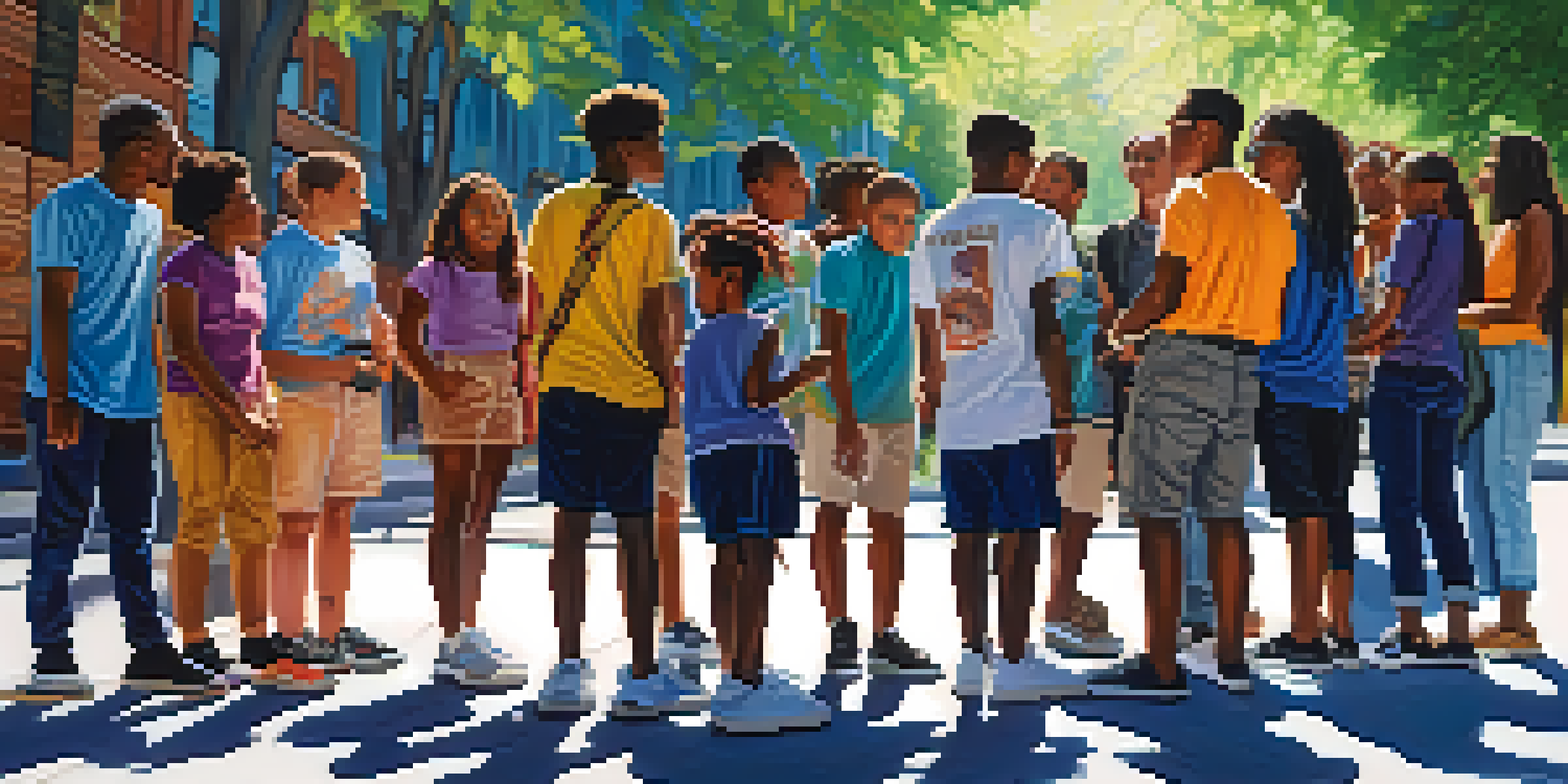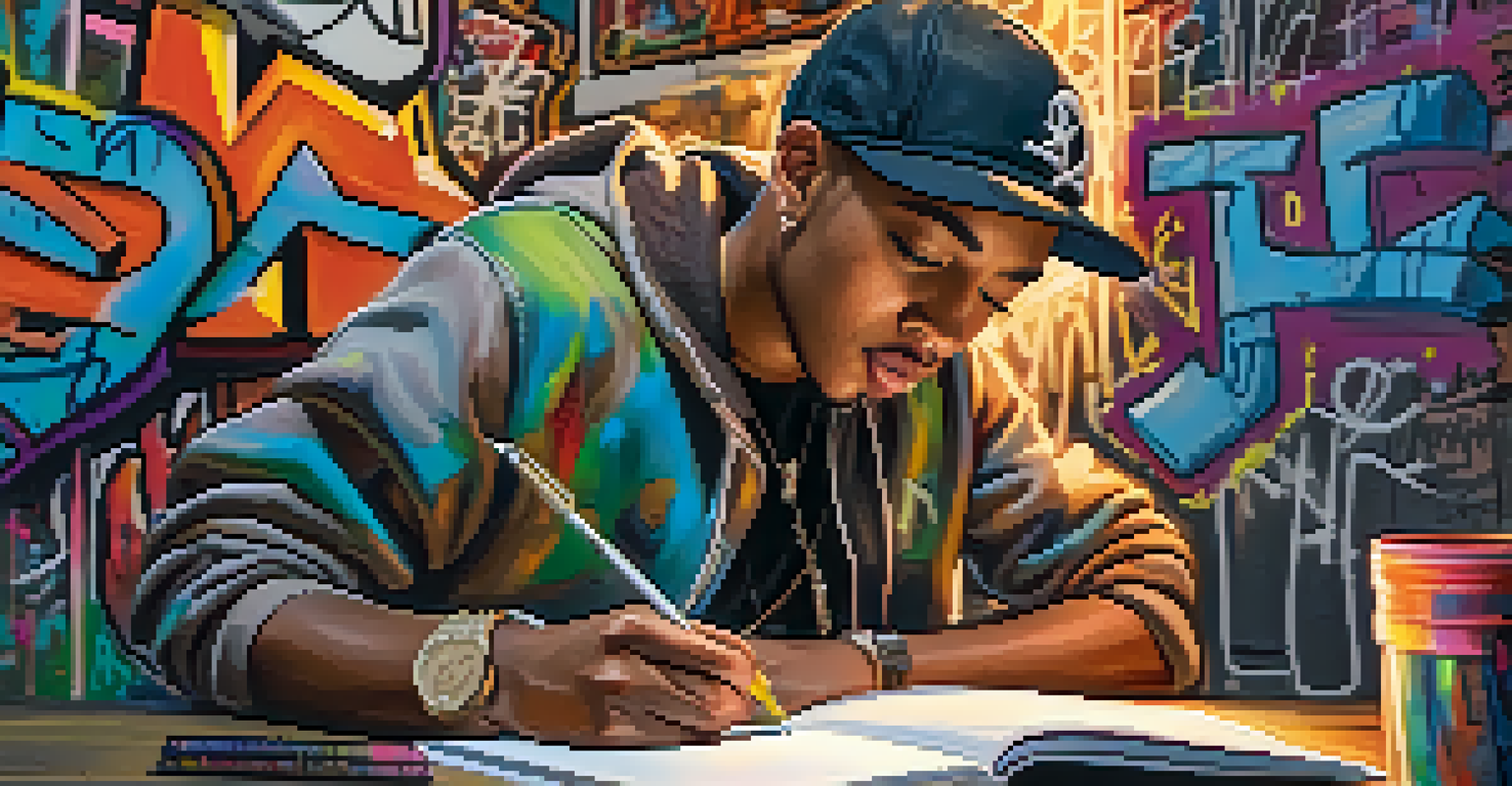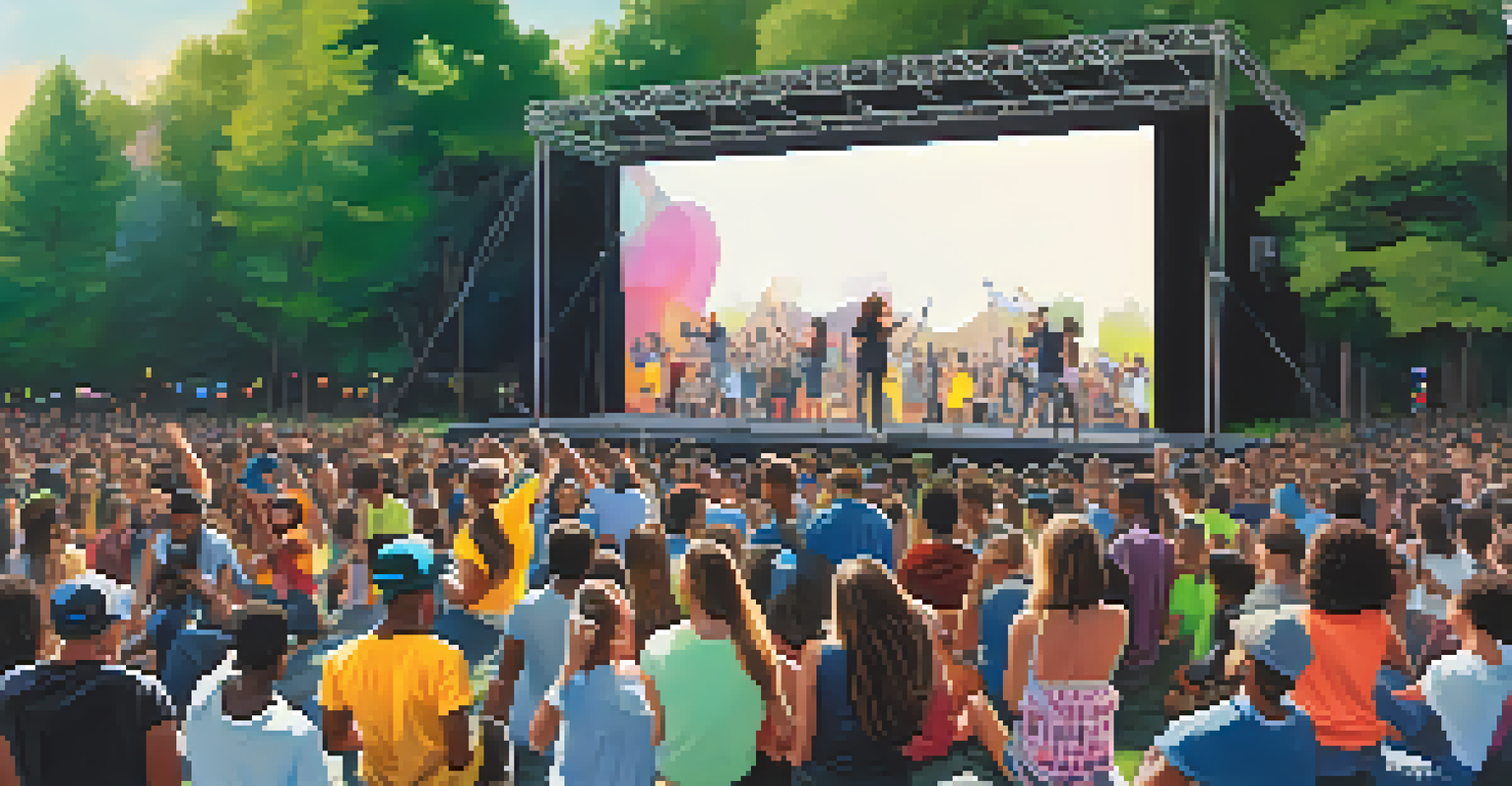The Influence of Rap on Youth Identity and Social Issues

Rap as a Reflection of Youth Identity and Culture
Rap music serves as a powerful mirror reflecting the realities of youth culture. It captures the struggles, aspirations, and experiences of young individuals, allowing them to see themselves in the lyrics. For many, this genre becomes a significant part of their identity, helping them navigate their place in an ever-changing world.
Rap is a way to express who you are and what you're feeling, it's a way to be honest and real.
Through storytelling and personal narratives, artists convey emotions and experiences that resonate deeply with listeners. This connection fosters a sense of belonging among youth, as they find common ground in shared challenges and triumphs. As a result, rap becomes not just entertainment but a vital expression of their identity.
Moreover, rap often embraces themes of authenticity and self-expression, encouraging young people to embrace their true selves. In a society that frequently pressures them to conform, rap empowers them to celebrate their uniqueness and individuality, shaping their identity in profound ways.
Rap's Role in Addressing Social Issues
Many rap artists tackle pressing social issues head-on, using their platforms to raise awareness and advocate for change. From systemic racism to poverty, the lyrics often highlight injustices that disproportionately affect marginalized communities. This bold approach resonates with youth, prompting them to engage with these critical conversations.

For example, songs addressing police brutality or mental health struggles can spark discussions among young listeners about their own experiences with these issues. This engagement not only educates but also encourages activism and solidarity among peers, fostering a sense of community and collective responsibility.
Rap Reflects Youth Identity
Rap music serves as a mirror for youth culture, capturing their struggles and aspirations while fostering a sense of belonging.
Furthermore, by shedding light on social issues, rap music can inspire young people to become advocates for change. When they see their favorite artists addressing real-world problems, it empowers them to speak out, volunteer, or participate in movements that aim to create a more just society.
The Emotional Connection of Rap Music
One of the most compelling aspects of rap is its ability to convey raw emotions. Artists often share their vulnerabilities, creating an emotional connection that resonates with listeners. This connection can be particularly impactful for youth navigating their own emotional landscapes, providing them with a sense of understanding and support.
The music is a reflection of the community and the people in it, it's a way to bring issues to light.
When a young person hears lyrics that articulate feelings of anger, sadness, or hope, it can validate their own experiences. This emotional resonance allows them to process their feelings, fostering mental wellness through music. In many ways, rap becomes a therapeutic outlet, helping youth cope with life's challenges.
Moreover, the communal experience of sharing and discussing rap music can strengthen emotional ties among peers. Listening to a song together and discussing its meaning can lead to deeper conversations about personal struggles, leading to increased empathy and support within their friendships.
The Empowerment of Marginalized Voices in Rap
Rap music has long been a platform for marginalized voices, allowing artists from diverse backgrounds to share their experiences. This representation is crucial for young listeners who may feel overlooked or misunderstood by mainstream society. By seeing their realities reflected in rap, they gain a sense of validation and empowerment.
Many artists use their platforms to challenge stereotypes and advocate for marginalized communities. This not only promotes inclusivity but also encourages youth to appreciate diversity in their own lives. By amplifying these voices, rap becomes a tool for social change and personal empowerment.
Rap Advocates for Social Change
Many rap artists address pressing social issues, empowering youth to engage in activism and advocate for change.
Additionally, the success of these artists can inspire young people to pursue their dreams, regardless of societal barriers. When they witness others overcoming obstacles and achieving success, it instills a belief that they too can make their mark on the world.
The Influence of Social Media on Rap and Youth
In today's digital age, social media plays a pivotal role in the evolution of rap music. Platforms like Instagram, TikTok, and Twitter allow artists to connect directly with their audience, fostering a sense of community. This immediacy enables youth to engage with their favorite artists in ways that were previously unimaginable.
Social media not only facilitates the sharing of music but also amplifies important messages and social issues highlighted in rap. Viral challenges and trends often center around rap songs, allowing youth to express their views and experiences creatively. This interactivity enriches their connection to the genre and its themes.
Moreover, the rise of social media influencers in the rap scene can shape youth culture significantly. When young listeners see influencers championing artists or discussing relevant social issues, it can inspire them to explore these themes further and engage in meaningful dialogue.
The Commercialization of Rap and Youth Culture
As rap has gained mainstream popularity, the commercialization of the genre has raised important questions about its authenticity. Many youth feel torn between the original messages of empowerment and the polished versions often seen in advertisements and media. This tension can lead to a disconnect between the art form and the cultural experiences it represents.
However, commercialization also provides opportunities for artists to reach wider audiences, which can amplify their messages. When mainstream platforms showcase diverse voices, it can challenge stereotypes and broaden the understanding of youth experiences. This balance between authenticity and commercial success is a critical topic within the rap community.
Emotional Connection in Rap
Rap's raw emotional expression resonates with listeners, providing a therapeutic outlet for youth navigating their feelings.
Additionally, young listeners are increasingly savvy about these dynamics. They often seek out underground artists who remain true to their roots, reinforcing the idea that authenticity matters. This desire for genuine connections keeps the spirit of rap alive, even in a rapidly changing industry.
The Future of Rap and Youth Engagement
Looking ahead, the future of rap will continue to evolve alongside youth culture and social landscapes. As new generations of artists emerge, they bring fresh perspectives and innovative sounds that reflect their realities. This ongoing evolution ensures that rap remains relevant to the experiences of young people today.
Moreover, as social issues persist, the role of rap in advocacy and activism will likely grow. Artists will continue to use their platforms to inspire change, encouraging youth to be vocal about the issues that matter to them. This synergy between rap and social movements fosters a sense of agency among young listeners.

Ultimately, the relationship between rap and youth identity will remain a dynamic and powerful force. By embracing the genre's potential for connection, empowerment, and social change, young people can navigate their identities while contributing to a more inclusive and conscious society.